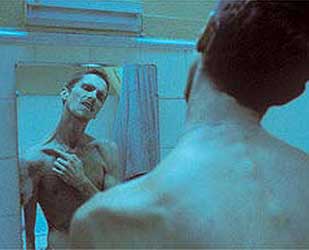The Machinist is not a film for the ages & is not apt to turn up on anyone's top-ten favorites five years later. But among recent films it is one of the best, in greatest part because of the central performance by Christian Bale, who committed himself to this role to the point of insanity, & forswears all actorly vanity beyond pride for an outstanding performance.
Bale lost sixty-odd pounds during the filming to convey literally the wasting-away of the protagonist's mental as well as his physical health. As a result he looks like a death-camp survivor. That he was willing to risk his own health for this role overshadowed the publicity then the reviews so that the artistic achievement of director Brad Anderson gets short shrift. Anderson used Bale's horrific physical presence as a focal point for sustaining the film's hellish atmospherics. Without Bale's ruined physique, the atmospherics would have been robbed of their power; but without the atmospherics, Bale would've risked his health for nothing beyond a freak show.
Whether slaving at industrial machines, or sitting in a gloomy diner, or wandering around in his apartment with a Coleman lantern after having forgotten to pay utilities, or driving through a tunnel after a phantom car, every scene is a scene in Hell, & nothing is too ordinary to lack the weight of threatening purpose.
The camera lingers for long periods on Bale's skeletal body & face, which is a face of torment. To a great extent, the strength of the film is pictorial rather than actorly, & certainly its strength is not the small plot it hangs on.
The story per se is almost nothing; it could've been a half-hour episode of the old black & white television series Alfred Hitchock Presents, & indeed the same storyline occurred in that series. It boils down to "guilt-induced hallucinations drive a man to confession." It has no more complexity than that in terms of plot. But what it is beyond plot is the most perfect portrait of clinical paranoia ever committed to film.
Horrible things are happening all around Bale's character, & he persistently finds clues to some terrible conspiracy against him, very unsettling clues. Yet rarely is anything objectively happening to him; it is paranoia for paranoia's sake, as is usually the case with mental illness, something filmic fiction almost never seems to know.
Our deteriorating machinist believes he has not slept for a year, & he is at least suffering from one of the worst cases of insomnia possible. He hallucinates from sleep deprivation, has enormous memory lapses, besides nodding off for brief moments in inappropriate places without knowing it, into dreamstates he cannot (& for a while, we cannot) tell from reality. He is pursued in a lackadaisical manner by the bullnecked Ivan who no one else has ever seen, who probably doesn't actually exist, unless he's a ghost. Weird post-its appear on the refrigerator which the Machinist cannot remember placing there, so that someone seems to have access to his apartment to screw with him. Endless paranoia.
There is a well-crafted performance by Michael Ironsides who is victimized by the machinist's paranoia, & a spectacular performance by Jennifer Jason Leigh as the call girl who foolishly loses herself in her own delusion that a broken sickly but seemingly gentle & loving man like Trevor might save her from a life of prostitution, a desirous dream that cannot be sustained. To some degree, her story is much more emotionally savage than the machinist's paranoid angst, because she is clinging to entirely the wrong shred of hope about life, whereas the machinist already knows this is a world of disappointments.
Brad Anderson has done a handful of films that avoid "the Hollywood Commonplace," daring films even when not showy. Happy Accident was an odd little love story with time travel in the brew. Session 9 is an outright horror story reliant on moody cinematography & grimy decadent sets for its effectiveness (much as with The Machinist). Next Stop Wonderland is on the surface "only" a light romantic comedy, but in reality mixes a deep cynicism about love with a touching romance in just the right balance so that it is neither lightweight nor too dark. Anderson just may be one of America's finest underrated directors, doing remarkable work almost by stealth, lest the money-men in Hollywood be frightened off by the threat of art.
copyright © by Paghat the Ratgirl
|
